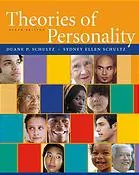Theories of personality
4.5
Reviews from our users

You Can Ask your questions from this book's AI after Login
Each download or ask from book AI costs 2 points. To earn more free points, please visit the Points Guide Page and complete some valuable actions.Introduction to "Theories of Personality"
"Theories of Personality" by Duane P. Schultz and Sydney Ellen Schultz is a comprehensive exploration of the rich and diverse field of personality psychology. This book navigates through the theoretical frameworks developed by psychologists throughout history to explain human behavior, motives, emotions, and character. Recognized globally as a seminal text within the academic and professional psychology communities, it provides a balanced portrait of historical and contemporary theories that shape our understanding of personality.
Carefully curated to be both accessible and enlightening, this book bridges the gap between complex psychological concepts and real-world applications. Whether you're a student, a clinician, or a curious reader, "Theories of Personality" is your gateway to understanding the forces and factors that contribute to individual uniqueness. The text draws from seminal research, experimental findings, and case studies, providing an in-depth analysis of the most impactful personality theories, including those proposed by Freudian, Neo-Freudian, trait, biological, humanistic, behavioral, and social-cognitive schools of thought.
Summary of the Book
At its core, "Theories of Personality" provides an encompassing overview of the various theories that have shaped the field of personality psychology. Each theory is presented with a clear explanation of its underlying principles, key contributors, historical context, and implications for understanding personality. The book is structured to allow readers to trace the evolution of personality theory, from its psychoanalytic roots to its modern, data-driven approaches.
The authors highlight the groundbreaking contributions of pioneers such as Sigmund Freud, Carl Jung, Alfred Adler, Carl Rogers, and Abraham Maslow, while also emphasizing the importance of modern contributors like Albert Bandura and Hans Eysenck. Each chapter goes beyond theoretical explanations to delve into how these theories were developed, supported, or challenged by empirical evidence. Real-world applications are provided, demonstrating how personality theories are used in therapy, organizational psychology, and personal growth contexts.
Furthermore, the book places each theory in its cultural, historical, and social context, helping readers understand how personality psychology is influenced by and impacts broader societal trends. The latest edition of the book also incorporates cutting-edge research and critiques of existing models, ensuring readers are introduced to the dynamism of the field.
Key Takeaways
- Gain a foundational understanding of major personality theories and their origins.
- Explore the practical applications of personality assessments in psychology and beyond.
- Recognize how societal and cultural factors shape the development of personality theories.
- Understand the intersection between biology, environment, and personality traits.
- Learn about modern critiques and alternative perspectives in personality psychology.
Famous Quotes from the Book
"Personality is not simply a collection of traits; it represents a dynamic and intricate interplay of biology, experiences, and the social environment."
"To understand human behavior, we must not merely look at external actions, but also delve deeply into internal motives and conflicts."
"Theories of personality are far more than academic exercises—they provide a lens through which we can better understand ourselves and those around us."
Why This Book Matters
"Theories of Personality" is more than a textbook—it is a cornerstone of the psychology discipline that fosters critical thinking and a deeper appreciation of human complexity. As humans, we are driven to understand what makes us unique, what shapes our behaviors, and how our histories contribute to our identity. This book provides the tools and frameworks to answer these questions with scientific rigor and intellectual curiosity.
The inclusion of both classical and cutting-edge perspectives ensures that readers not only appreciate traditional psychological paradigms but also embrace emerging models of thought. This dual focus makes the book a must-read for anyone interested in the ever-evolving science of personality. Additionally, by connecting theory to practical applications, the book equips readers for careers in psychology, counseling, management, education, and beyond.
Ultimately, "Theories of Personality" matters because it invites us all to engage with the continuous search for meaning, identity, and purpose—a search that lies at the heart of human existence.
Free Direct Download
You Can Download this book after Login
Accessing books through legal platforms and public libraries not only supports the rights of authors and publishers but also contributes to the sustainability of reading culture. Before downloading, please take a moment to consider these options.
Find this book on other platforms:
WorldCat helps you find books in libraries worldwide.
See ratings, reviews, and discussions on Goodreads.
Find and buy rare or used books on AbeBooks.
1212
بازدید4.5
امتیاز50
نظر98%
رضایتReviews:
4.5
Based on 0 users review
"کیفیت چاپ عالی بود، خیلی راضیام"
Questions & Answers
Ask questions about this book or help others by answering
No questions yet. Be the first to ask!


